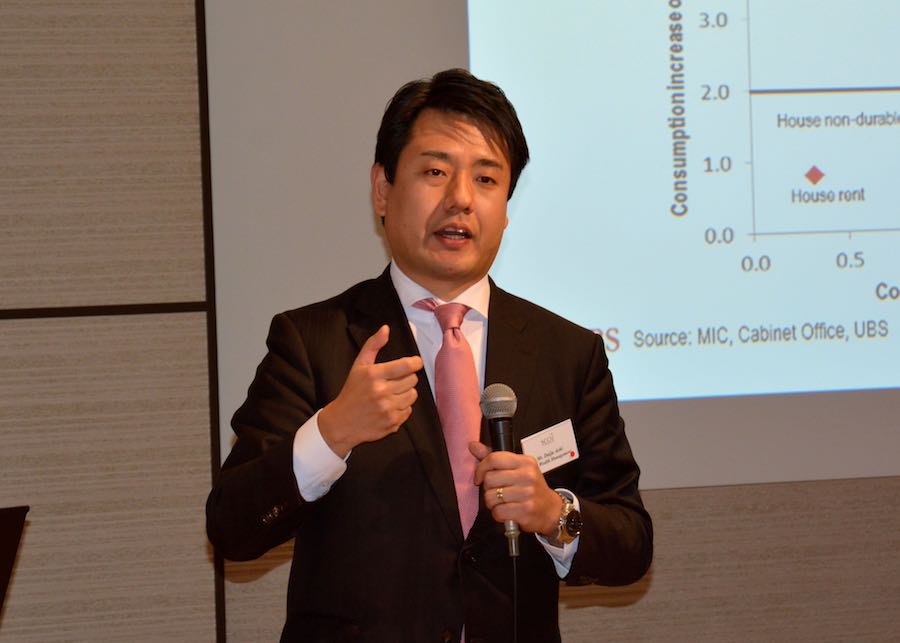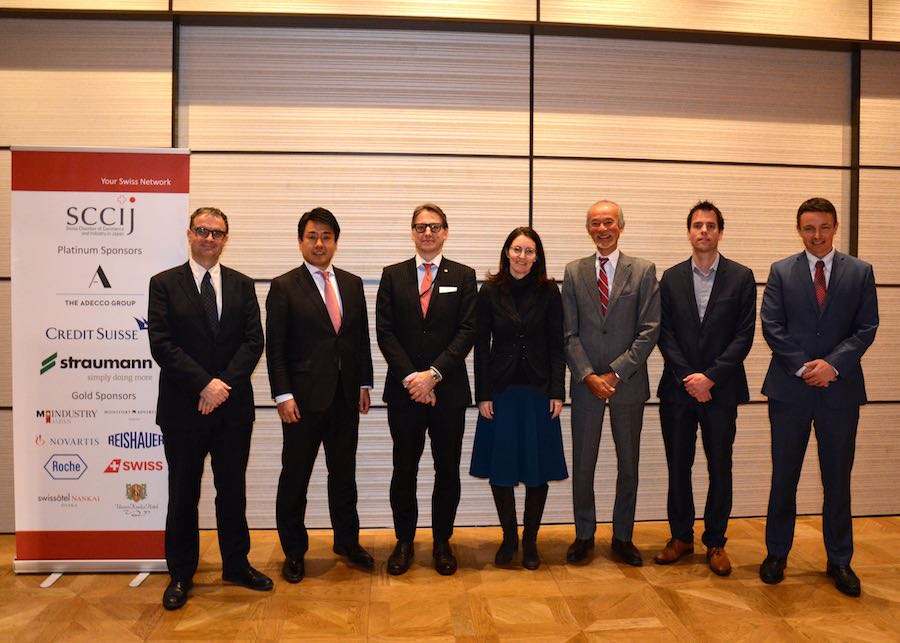Tokyo (SCCIJ) – The global and the Japanese economy will continue to solidly grow this year, predicted Mr. Daiju Aoki, Regional CIO and Chief Economist for Japan at UBS’s Chief Investment Office, Wealth Management, at the SCCIJ January Luncheon attended by more than 60 people. In Japan, growth momentum would be supported by domestic demand rather than exports. Another positive factor would be the stable political situation. The luncheon talk also focused on the consequences of the severe labor shortage, the Bank of Japan’s monetary policy framework and the fourth arrow of Abenomics aimed at reducing corporate cash and deposits.
Rate gap implies weak yen
UBS Japan is quite optimistic about the Japanese economy and expects solid growth at 1.8 percent in 2018. “Recent data suggest that the growth rate in 2018 will be stronger than the trend growth rate of 1 percent”, Mr. Aoki said. Support for growth would come from solid oil demand in China and other Asian economies. The oil price would stabilize at the range of $50-60 in 2018.
The speaker also plunged into the currency market. “We expect enlarging rate gap between the 10-year bond yields in the US and Japan will support USD/JPY in 2018”, Mr. Aoki said. A rate gap of 2.5 percentage points would support an exchange rate of 115 yen per dollar.

SCCIJ January Luncheon speaker Mr. Daiju Aoki, Regional CIO and Chief Economist of UBS Japan
Rising inflation and bond yield target
He also predicted that inflation would likely reach 1.2 percent year on year, driven by labor shortage and solid growth. As a result, the Bank of Japan would raise its yield target for the 10-year Japanese Government Bond (JGB) from 0 to 0.2 in the second half of 2018. The risk of Japan’s 10-year yield climbing above 0.2 percent will emerge if the US 10-year yield climbs still further or if inflation overshoots expectations.
At the same time, Mr. Aoki does not expect the Japanese government to implement painful but necessary economic reforms. Instead, the cabinet of prime minister Shinzo Abe and the governing Liberal Democratic Party (LDP) will focus on changing Japan’s constitution. Politicians would be preoccupied with the leadership election of the LDP in September. “Prime Minister Abe can survive as long as his approval rating remains above 30 percent”, he predicted.
Capital expenditure for productivity
The luncheon speaker pointed to demography as one driver of the macro economy. “The fall of the working-age population ratio that began in 1992 eroded Japan’s relative competitive strength, leading to downbeat consumption and investment patterns among households and companies,” he explained. Other industrial nations would now face a similar challenge because they also have passed the peak of their working-age population. “I call this the Japanization of the global economy”, he said.
But there would be room to increase productivity as an answer to this challenge, the speaker argued. “Labor-savings investment seems to have started to take off in industries in which women and seniors cannot make up for shortage”, he observed. In particular, companies would increase new capex related to IT, cloud technology, remote, robot technology and artificial intelligence for higher labor and capital efficiency. “As a result, there will be a larger gap between winners and losers in non-manufacturing sectors where labor shortage is most severe”, he said. Also, M&A activities would accelerate within Japan’s domestic market.
Mr. Aoki made two more predictions about the labor market: First, women labor participation would continue to grow. “At 68 percent, it already is higher than in the US but it is likely to reach 70 to 72 percent within a couple of years.” Second, the growth of the foreign labor force in Japan which recently went above 1 million would also accelerate. Its ratio would rise from currently 1 percent of the working population and reach to above 5 percent within ten years.

Members and advisors of the SCCIJ Executive Committee with speaker Mr. Daiju Aoki
Corporate savings as the key
Japan’s corporate savings rate is the lowest since 2000. “It will drop to 0 percent within a year or two which is consistent with 1 percent core consumer price index”, the speaker told the audience. But the government would like to see a negative savings rate because companies are holding JPY 211 trillion of cash and deposits among their assets, mainly from JPY 406 trillion of retained earnings on the liability side (figures of the end of fiscal year 2016).
“Attempts to reduce this cash and deposits will be Abenomics’ fourth arrow,” the speaker explained. Pressure would also be exerted by shareholders and the financial market. “Whereas most Japanese companies think the level of cash holdings is appropriate, investors are not satisfied with current level of cash holdings”, Mr. Aoki said.
Also, UBS Japan is rather conservative when it comes to profit growth prediction at private companies this year. “After strong growth in fiscal year 2017 of about 12 percent, the growth rate will likely slow down to 1 percent in the upcoming fiscal year starting on April 1”, Mr. Aoki said. Former earnings drivers such as the weaker yen, lower corporate tax rates and a rebound from asset-impaired loss booked in 2016 would likely lose steam.
Biography of the speaker
Mr. Daiju Aoki is the Regional CIO and Chief Economist for Japan at UBS’s Chief Investment Office, Wealth Management. He focuses on Japan’s macroeconomics, currencies and fixed income, as well as on enhancing communication of the UBS Wealth Management House View.
Prior to joining the wealth management division, he served as Economist for UBS Investment Bank’s Equity Research franchise in Japan. In that role, Mr. Aoki offered views on Japanese macroeconomics, policies and financial markets, and advised institutional clientele on investment decisions. In 2016, he ranked top economist among global firms (5th overall) in the Institutional Investor “All-Japan Research Team” rankings, and he placed 2nd (7th overall) in the Nikkei Veritas Analyst Ranking Survey.
Mr. Aoki joined UBS Securities in 2010. Prior to that, he served nine years as an economist in Japan’s Cabinet Office where he was responsible for macro-econometric models used in mid-long term economic and fiscal projections and in policy planning under the Koizumi, Abe and Fukuda Cabinets. Mr. Aoki holds a Master’s degree in Economics from Brown University.
Text and photos: Martin Fritz for SCCIJ





























